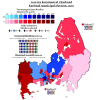Alex Richards
Donor
Those are some amusing ward names. I mean, Heavitree? Mincinglake? Pinhoe?
The West Country's stereotypically a bit weird in general
Those are some amusing ward names. I mean, Heavitree? Mincinglake? Pinhoe?
Those are some amusing ward names. I mean, Heavitree? Mincinglake? Pinhoe?

Gustaf Fröding, Nils Ferlin (though he's usually more closely associated with Filipstad), Zarah Leander and Stefan Holm.
Come on, nothing's weirder than the pronunciation of Appletreewick. (Did I spell that right?)That's the West Country for you. Pennsylvania's pretty strange as well (and goes nicely with Maryland ward in one of the other councils I've done, can't remember which). Apparently it was named by a Quaker colonist who changed his mind and came home from America.

One of these is not like the other.
IIRC, Karlstad is one of these places regarded to be somewhat of a bellwether, and like usual in these cases it's not that representative when you look at the actual statistics. It's also said that the sun always shines in Karlstad - whether it's related to the citizens' perceived happiness is unknown.
Of note is that the Centre Party has recruited Bengt Alsterlind, a popular children's TV host from a few decades ago, to run for City Council. He's number 6 on the list, but it will be interesting to see if he can gain votes for the party and enough personal votes to send him in.
Come on, nothing's weirder than the pronunciation of Appletreewick. (Did I spell that right?)
Aptrick.How's that pronounced then? I'm willing to bet it's no odder than the pronunciation of Godmanchester.
Aptrick.
How's Godmanchester pronounced? I canoed through there a few years ago, but we didn't really stop, and everyone on the trip just pronounced it like Manchester with God on the front.
I was actually going to mention Alsterlind in the post - not because of this, since I didn't know of this before, but simply because it's nigh impossible to mention Karlstad in any context without someone bringing up Hajk. I'm willing to bet he's going to get elected on personal votes, but in a more serious matter, you seem to have forgotten our translation convention. "City council" can refer to both the assembly and the executive, and consequently I for one prefer to use the less ambiguous "municipal assembly" in this context. It's boring, but practical.
What is KomP and SPP? One looks like its far-right, the other's centrist/social liberal.

And when does the actual campaigning start? I would assume it doesn't go on for the entire period between the selection of candidates and the election.
When Parliament is dissolved. Of course, now that its a fixed date, some MPs or MP-candidates may try campaigning earlier...
I suppose that's the natural consequence of single-member representation - in Sweden we naturally don't have any single person who's expected to represent our interests at all times (the closest you get to that is Gotland, which has two MPs), so the parties only showing up when there's an election is seen as perfectly natural - that's what they're for, after all.
Gosh, that's late. Both Labour target candidates here (and one who isn't) have been campaigning since selection - there's already been a full circuit of Aberconwy.Well, no. People selected as candidates for parliament generally start campaigning immediately if they're in a target seat. Bear in mind that 'campaigning' can mean 'doorstepping once a week', and it ramps up gradually over time, eventually becoming a 24/7 activity once the election is called. Voters traditionally react badly to 'only hearing from candidates when there's an election on', so campaigning a long time before the dissolution of parliament has always been a wise move.
In Croydon, for example, Gavin Barwell is expected to launch his 're-election campaign' in June/July of this year, while Sarah Jones, his Labour opponent, is also believed to be increasing her activity at the same time. The local elections in Croydon are on 22 May, so after that both parties will focus on next year's General.
This is the biggest drawback with PR, really, and is why I favor MMP. If nothing else, it would make for more maps, which is always a valid argument.
Gosh, that's late. Both Labour target candidates here (and one who isn't) have been campaigning since selection - there's already been a full circuit of Aberconwy.